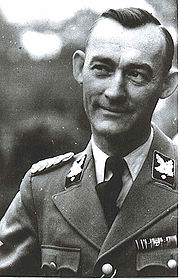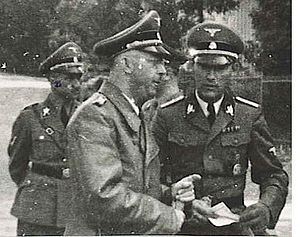
Erwin Rösener
Encyclopedia

Schutzstaffel
The Schutzstaffel |Sig runes]]) was a major paramilitary organization under Adolf Hitler and the Nazi Party. Built upon the Nazi ideology, the SS under Heinrich Himmler's command was responsible for many of the crimes against humanity during World War II...
-Obergruppenführer
Obergruppenführer
Obergruppenführer was a Nazi Party paramilitary rank that was first created in 1932 as a rank of the SA and until 1942 it was the highest SS rank inferior only to Reichsführer-SS...
(General) who was responsible for mass executions of civilians in Slovenia
Slovenia
Slovenia , officially the Republic of Slovenia , is a country in Central and Southeastern Europe touching the Alps and bordering the Mediterranean. Slovenia borders Italy to the west, Croatia to the south and east, Hungary to the northeast, and Austria to the north, and also has a small portion of...
and was posthumously on the indictment at the Nuremberg Trials
Nuremberg Trials
The Nuremberg Trials were a series of military tribunals, held by the victorious Allied forces of World War II, most notable for the prosecution of prominent members of the political, military, and economic leadership of the defeated Nazi Germany....
for war crimes.
Early life and career
Rösener was born on 2 February 1902 in SchwerteSchwerte
Schwerte is a town in the district of Unna, in North Rhine-Westphalia, Germany.-Geography:Schwerte is situated in the Ruhr valley, at the south-east border of the Ruhr Area...
, a town in North Rhine-Westphalia
North Rhine-Westphalia
North Rhine-Westphalia is the most populous state of Germany, with four of the country's ten largest cities. The state was formed in 1946 as a merger of the northern Rhineland and Westphalia, both formerly part of Prussia. Its capital is Düsseldorf. The state is currently run by a coalition of the...
. He joined the Nazi party and the Sturmabteilung
Sturmabteilung
The Sturmabteilung functioned as a paramilitary organization of the National Socialist German Workers' Party . It played a key role in Adolf Hitler's rise to power in the 1920s and 1930s...
(SA) or 'Brownshirts' on 6 November 1926. He applied to join the Waffen-SS
Waffen-SS
The Waffen-SS was a multi-ethnic and multi-national military force of the Third Reich. It constituted the armed wing of the Schutzstaffel or SS, an organ of the Nazi Party. The Waffen-SS saw action throughout World War II and grew from three regiments to over 38 divisions, and served alongside...
in October 1929 (his application was accepted in 1930). He was promoted 11 times between 1930 and 1944, eventually finishing with the rank of SS-Obergruppenführer and General of the Waffen-SS and Police. He was a member of the Freundeskreis der Wirtshaft, or "Circle of Friends of the Economy", a group of German industrialists whose aim was to raise funds for racial research within the Third Reich. He was close to Heinrich Himmler
Heinrich Himmler
Heinrich Luitpold Himmler was Reichsführer of the SS, a military commander, and a leading member of the Nazi Party. As Chief of the German Police and the Minister of the Interior from 1943, Himmler oversaw all internal and external police and security forces, including the Gestapo...
, and reported directly to him during the war.
War crimes in Yugoslavia
From the end of 1941 to the end of the war Himmler assigned Rösener to SS-Oberabschnitt AlpenlandSS-Oberabschnitt Alpenland
SS-Oberabschnitt Alpenland was one of two main division strength commands of the Allgemeine-SS in the country of Austria. The Alpenland Oberabschnitt was formed in 1939, a year after Germany incorporated Austria through the Anschluss...
, part of whose territory was Slovenia. Between October 1944 and the end of the war he was head of anti-Partisan
Partisans (Yugoslavia)
The Yugoslav Partisans, or simply the Partisans were a Communist-led World War II anti-fascist resistance movement in Yugoslavia...
warfare in Ljubljana
Ljubljana
Ljubljana is the capital of Slovenia and its largest city. It is the centre of the City Municipality of Ljubljana. It is located in the centre of the country in the Ljubljana Basin, and is a mid-sized city of some 270,000 inhabitants...
. During both assignments he ordered the execution of civilians, hostages and prisoners of war, actions which led to his name being on the indictment for war crimes at Nuremberg
Nuremberg Trials
The Nuremberg Trials were a series of military tribunals, held by the victorious Allied forces of World War II, most notable for the prosecution of prominent members of the political, military, and economic leadership of the defeated Nazi Germany....
.
Rösener worked closely with Leon Rupnik
Leon Rupnik
Leon Rupnik, also known as Lav Rupnik or Lev Rupnik was a Slovene general during the Kingdom of Yugoslavia who collaborated with the Fascist Italian and Nazi German occupation forces during World War II...
in fighting the Partisans
Partisans (Yugoslavia)
The Yugoslav Partisans, or simply the Partisans were a Communist-led World War II anti-fascist resistance movement in Yugoslavia...
, and ordered the formation of the pro-Nazi Domobranci, the Slovenian Home Guard forces on 24 September 1943. Rösener escaped to Austria after the war but was arrested by the British and returned to Yugoslavia. He was put on trial alongside Leon Rupnik
Leon Rupnik
Leon Rupnik, also known as Lav Rupnik or Lev Rupnik was a Slovene general during the Kingdom of Yugoslavia who collaborated with the Fascist Italian and Nazi German occupation forces during World War II...
and others, and was sentenced to death on 30 August 1946.
He was executed by hanging
Hanging
Hanging is the lethal suspension of a person by a ligature. The Oxford English Dictionary states that hanging in this sense is "specifically to put to death by suspension by the neck", though it formerly also referred to crucifixion and death by impalement in which the body would remain...
on 4 September 1946, and was buried the same day in an unmarked grave at Ljubljana's Žale
Žale
Žale Central cemetery , often abbreviated to Žale, is the largest and the central cemetery in Ljubljana. It is located in the Bežigrad district and operated by the Žale Public Company.- History :...
cemetery.


